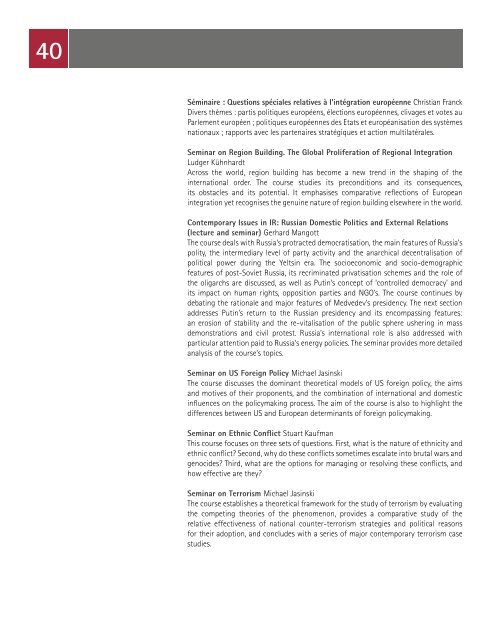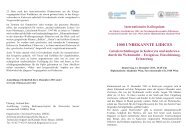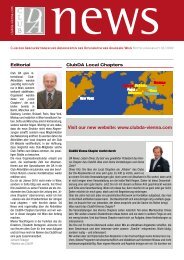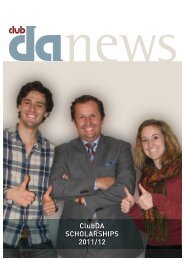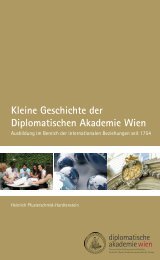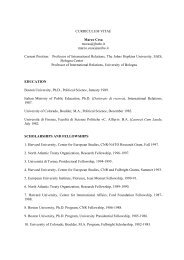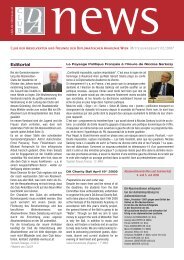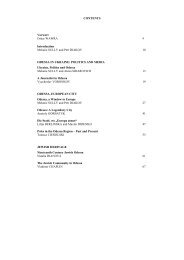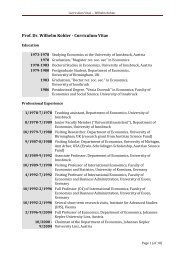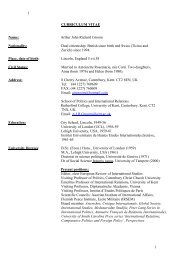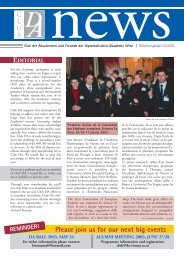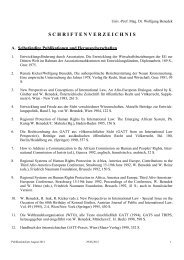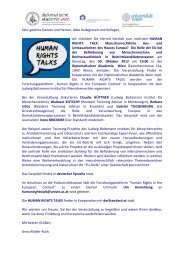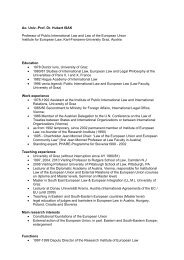Brochure - Diplomatic Academy Vienna
Brochure - Diplomatic Academy Vienna
Brochure - Diplomatic Academy Vienna
You also want an ePaper? Increase the reach of your titles
YUMPU automatically turns print PDFs into web optimized ePapers that Google loves.
40<br />
Séminaire : Questions spéciales relatives à l’intégration européenne Christian Franck<br />
Divers thèmes : partis politiques européens, élections européennes, clivages et votes au<br />
Parlement européen ; politiques européennes des Etats et européanisation des systèmes<br />
nationaux ; rapports avec les partenaires stratégiques et action multilatérales.<br />
Seminar on Region Building. The Global Proliferation of Regional Integration<br />
Ludger Kühnhardt<br />
Across the world, region building has become a new trend in the shaping of the<br />
international order. The course studies its preconditions and its consequences,<br />
its obstacles and its potential. It emphasises comparative reflections of European<br />
integration yet recognises the genuine nature of region building elsewhere in the world.<br />
Contemporary Issues in IR: Russian Domestic Politics and External Relations<br />
(lecture and seminar) Gerhard Mangott<br />
The course deals with Russia’s protracted democratisation, the main features of Russia’s<br />
polity, the intermediary level of party activity and the anarchical decentralisation of<br />
political power during the Yeltsin era. The socioeconomic and socio-demographic<br />
features of post-Soviet Russia, its recriminated privatisation schemes and the role of<br />
the oligarchs are discussed, as well as Putin’s concept of ‘controlled democracy’ and<br />
its impact on human rights, opposition parties and NGO’s. The course continues by<br />
debating the rationale and major features of Medvedev’s presidency. The next section<br />
addresses Putin’s return to the Russian presidency and its encompassing features:<br />
an erosion of stability and the re-vitalisation of the public sphere ushering in mass<br />
demonstrations and civil protest. Russia’s international role is also addressed with<br />
particular attention paid to Russia’s energy policies. The seminar provides more detailed<br />
analysis of the course’s topics.<br />
Seminar on US Foreign Policy Michael Jasinski<br />
The course discusses the dominant theoretical models of US foreign policy, the aims<br />
and motives of their proponents, and the combination of international and domestic<br />
influences on the policymaking process. The aim of the course is also to highlight the<br />
differences between US and European determinants of foreign policymaking.<br />
Seminar on Ethnic Conflict Stuart Kaufman<br />
This course focuses on three sets of questions. First, what is the nature of ethnicity and<br />
ethnic conflict? Second, why do these conflicts sometimes escalate into brutal wars and<br />
genocides? Third, what are the options for managing or resolving these conflicts, and<br />
how effective are they?<br />
Seminar on Terrorism Michael Jasinski<br />
The course establishes a theoretical framework for the study of terrorism by evaluating<br />
the competing theories of the phenomenon, provides a comparative study of the<br />
relative effectiveness of national counter-terrorism strategies and political reasons<br />
for their adoption, and concludes with a series of major contemporary terrorism case<br />
studies.


